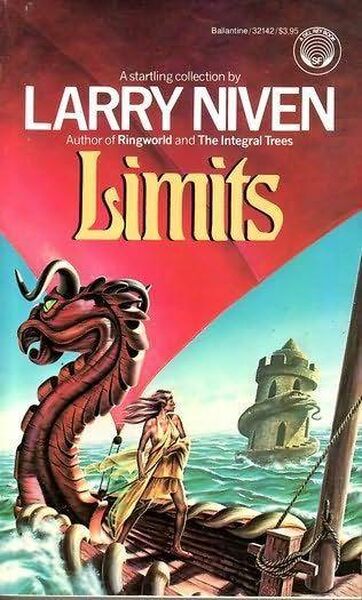If Dreams Were Lightning
Limits
By Larry Niven

6 Jul, 2023
Larry Niven’s 1985 Limits is a collection of science fiction and fantasy stories.
Limits was, to my knowledge, the final Niven collection published by Del Rey. The next collection, N‑Space (1990), was published by Tor and (for reasons to be explained later) padded with novel excerpts. In addition to the overlap with prior collections, that was enough to convince me to stop buying Niven collections. Well, there were other reasons but that was a large part of it. Thus, this is the final collection of the set I’ve very arbitrarily dubbed “my essential Niven short fiction collections.”
The best part of this re-reading: the introduction. It gave me background information that young James didn’t have the perspective to appreciate. As for the stories: typical late 1970s, early to mid-1980s Niven stories. A bit cranky, not as interesting as his early work, reliant on worn-out tropes. The Draco Tavern stories are something of an exception, being short, slight, and mostly harmless.
Limits is no Neutron Star (my favorite Niven collection). I probably would have stopped buying new Niven collections even if N‑Space hadn’t been padded with novel excerpts and previously collected stories.
Limits is available here (Amazon US), here (Amazon Canada), here (Amazon UK), here (Apple Books), here (Barnes & Noble), and here (Kobo). Oddly, I didn’t find it at Chapters even though Kobo books are sold through Chapters.
Any work undated appears to be original to this collection. All stories are by Niven. Collaborators are listed as [with NAME].
Now for the story by story.
Introduction (Limits) • essay
Niven explains why his focus is primarily on novels: that’s where the money is. Nevertheless, he still writes short stories. He provides background details on the various pieces.
One suspects that it was the combination of fewer new stories to collect and reader yen for big fat books that forced Tor to resort to adding novel excerpts.
The Lion in His Attic • [Magic Goes Away] • (1982) • novelette
Ambitious scoundrels seeking magical treasure underestimate their foe.
Spirals • (1979) • novella • with Jerry Pournelle
A scoundrel is forced by poor financial investments to be a useful member of society. IN SPACE.
To quote my earlier review of this tale,
This is a rich stew of utterly stock plot developments, rote characterization, and objectionable elements.
“A Teardrop Falls” • [Berserker (Fred Saberhagen)] • (1983) • short story
One AI resolves to make the world-wrecking Berserkers pay for their crimes.
Berserker technology is robust, durable, formidable, and without the most rudimentary computer security. Nothing like Kaspersky or BitDefender; not even MacAfee.
Talisman • [Magic Goes Away] • (1981) • novelette • with Dian Girard
A professional thief is drafted into a treasure hunt by a man not half as gullible as she thought he was.
This is a very Girard story, in which a woman trapped by circumstance seeks freedom in ways that society might overlook.
Flare Time • [Medea] • (1978) • novelette
A comparatively poor colony on a fascinating backwater world is threatened by a stupid woman, who is stupid. And also a woman.
There were other reasons I stopped reading Niven, but the misogyny was one of the most irritating ones. Perhaps not entirely coincidentally, this is another Niven story featuring inflexible alien gender roles.
This work was intended for Harlan Ellison’s Medea shared-world project, which to (again) quote an earlier review:
Medea began as a 1975 UCLA seminar called “10 Tuesdays Down a Rabbit Hole” and … eventually … became the 1985 shared-world anthology, Medea: Harlan’s World.
Niven provides a much earlier start date:
Beginning around 1970, Harlan Ellison enlisted a team to build a solar system and to write stories within it.
It’s almost enough to make me borrow UWaterloo’s copy of Medea to check on what Ellison said. Poor me, working next to a ten-story library.
The Locusts • (1979) • novelette • with Steven Barnes
Interstellar colonization reveals a dreadful secret about human biology.
There are many reasons to dislike this story, but surely the cruelty to biology must be the greatest.
Yet Another Modest Proposal: The Roentgen Standard • (1984) • essay
A mean-spirited proposal to manage nuclear waste.
“Folk Tale” • [Draco Tavern] • (1984) • short story
Rick Schumann works out how to bond with predatory aliens.
“The Green Marauder” • [Draco Tavern] • (1980) • short story
An ancient traveler reveals to Schumann that humans are not Earth’s first intelligent species.
I am shocked, shocked, that Niven would have written a story about out-of-control ecosystem transformation obliterating an oblivious civilization, given Fallen Angels.
“War Movie” • [Draco Tavern] • (1981) • short story
An economically predatory alien is undone by the human capacity for shame.
“The Real Thing” • [Draco Tavern] • (1982) • short story
Is the alien gift as wonderful as it seems or is it merely a bait-and-switch?
“Limits” • [Draco Tavern] • (1981) • short story
Schumann discovers aliens are (for what they feel are justifiable reasons) withholding the secret of immortality from humans.
The story ends with Schumann frustrated because he’s not sure which aliens he overheard. Reflection may bring comfort. Surely the biggest secret to immortality is that it is possible at all?
